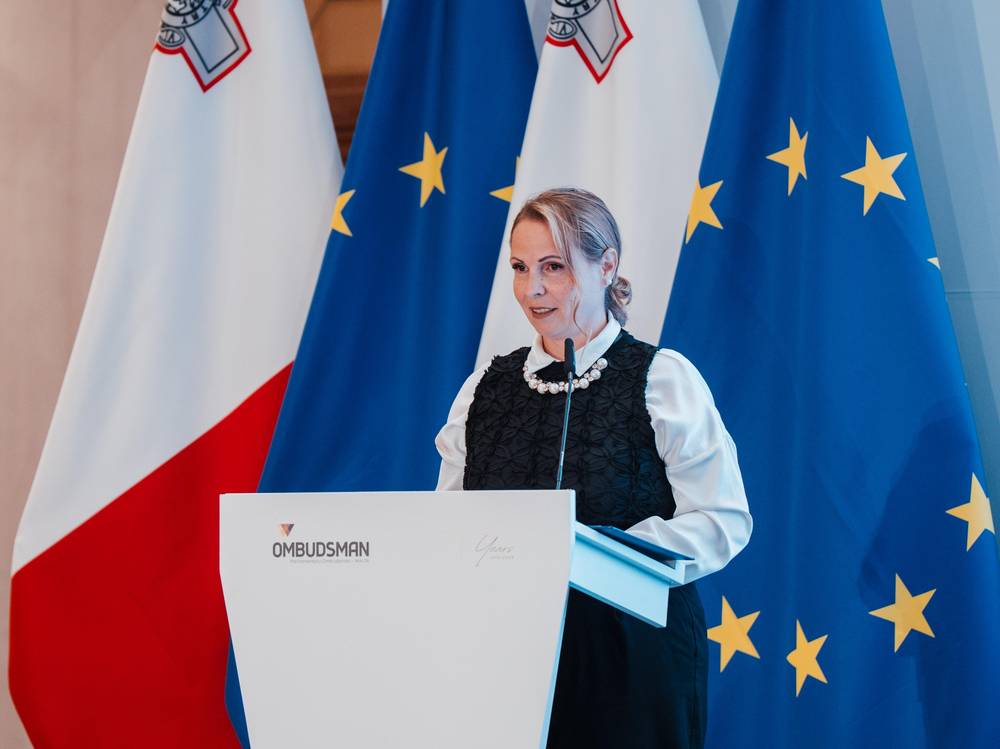In Valletta, Deputy Ombudsman Dr. Dijana Možina Zupanc is attending an international conference on the importance, role, and work of the Ombudsman institution, at the invitation of Maltese Ombudsman Joseph Zammit McKeon. At a time defined by social inequalities, the fragility of health and social systems, the climate crisis, rising tensions threatening peace and security, digitalisation and the development of artificial intelligence, political turmoil, and a lack of democratic dialogue, the discussions are focusing primarily on the importance of trust in democratic institutions, integrity, and ethical governance. The conference, organised by the Maltese Parliamentary Ombudsman on the occasion of its 30th anniversary, has brought together ombudsmen, their deputies, and representatives of national human rights institutions, along with numerous international networks and organisations. Alongside other distinguished speakers, the European Ombudsman Teresa Anjinho and the Speaker of the House of Representatives of Malta, Anġlu Farrugia, addressed the conference participants.
Deputy Ombudsman Dr. Dijana Možina Zupanc actively participated in the discussion on the role of the Human Rights Ombudsman institution in protecting the most vulnerable. She highlighted that in a society where competition, individualism, and the pursuit of personal success are often prioritized, essential values such as empathy, solidarity, and care for the community are, unfortunately, frequently overlooked. “On one hand, digital reality provides us with access to information, services, and new forms of engagement, while at the same time increasingly isolating us within our own bubbles and pushing the most vulnerable even further into the background. Preoccupied by our own realities, we risk losing awareness of the struggles faced by others and our shared future,” said the Deputy Ombudsman, emphasising that a society indifferent to the vulnerable cannot be just. According to her, caring for others is essential not only as a moral principle but also as the foundation for a healthy, resilient, and interconnected community. She also pointed out that encouraging positive public dialogue is necessary for a healthy democracy, with the media, political actors, the education system, and all others who influence public opinion bearing significant responsibility in fostering a culture of dialogue.
She highlighted that independent institutions, such as the Human Rights Ombudsman, serve for more than merely considering complaints or petitions, issuing recommendations to address injustices. “Our mission goes far beyond this – we serve as guardians of dignity and the moral compass of society. We do not merely provide decision-makers with recommendations and insights into human rights violations; we also actively advocate for systemic change. To remain relevant, we must move beyond traditional frameworks and embrace bold thinking. We have the opportunity to leave future generations a society in which human rights are implemented in practice, not just in theory. This will only be possible if we replace our outdated approaches, excessive politeness, and even the occasional servility with courage that demands answers and accountability, regardless of pressure and criticism we may encounter from the authorities,” Dr. Možina Zupanc emphasised. They discussed these matters with Debbie Kohner, Secretary General of the European Network of National Human Rights Institutions (ENNHRI), Dmytro Lubinets, Ukrainian Parliament Commissioner for Human Rights, Marina Ceyssac[MS1] , High Commissioner for the Protection of Rights, Liberties and for Mediation of Monaco, Lorraine Schembri Orland, Judge at the European Court of Human Rights, Dr. Tamar Gvaramadze, Deputy Public Defender of Georgia, and Andreas Accardo, representative of the European Union Agency for Fundamental Rights (FRA). They agreed that the role of human rights institutions will become even more crucial in the future, as the protection of human rights is inseparably linked to protecting the fundamental conditions of life, including the environment, stability, and peace.
During her speech, Dr. Dijana Možina Zupanc also addressed environmental challenges: “Climate change is undeniably a human rights crisis and is one of my greatest concerns. Rising temperatures, floods, and droughts are already threatening the health, safety, and dignity of many. These pressures are also driving migration – by 2050, up to 216 million people may be displaced – while older individuals, often energy-poor and socially isolated, are particularly vulnerable. In addition, armed conflicts destroy lives and account for approximately six percent of global emissions, creating a vicious cycle of destruction between war and climate,” highlighted the Deputy Ombudsman. She stressed that the role of human rights ombudsmen is therefore extremely important, not only in highlighting shortcomings in state action but also in raising awareness of the right to a healthy environment and advocating for ambitious and fair climate policies.
Alongside the conference, the General Assembly of the Association of Mediterranean Ombudsmen (Association of Mediterranean Ombudsmen - AOM), was held, with Deputy Ombudsman Dr. Dijana Možina Zupanc participating in the Board Members meeting, where the Slovenian Human Rights Ombudsman also holds membership. In addition to meeting with the Maltese Ombudsman Joseph Zammit McKeon, who also serves as Secretary General of AOM, Dr. Možina Zupanc held a bilateral discussion with the President of AOM, Albanian Ombudswoman Erinda Ballanca, during which they confirmed the excellent cooperation between their institutions. She also attended a reception hosted by the President of Malta, Myriam Spiteri Debono.
[MS1]Pazite, v originalu je ta priimek narobe zapisan.

![[Translate to English:] Namestnica varuha dr. Dijana Možina Zupanc za govorniškim pultom. V ozadju so zastave.](/fileadmin/_processed_/d/0/csm_image00002_9e166f2118.jpg)
![[Translate to English:] Okrogla miza na kateri je sodelovala tudi dr. Možina Zupanc](/fileadmin/_processed_/f/2/csm_image00007_56d3df2b6a.jpg)
![[Translate to English:] Pogled iz publike na udeležence okrogle mize](/fileadmin/_processed_/6/c/csm_image00003_cb1fbe08d9.jpg)